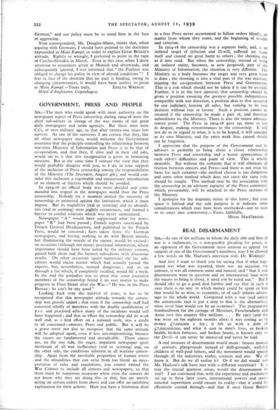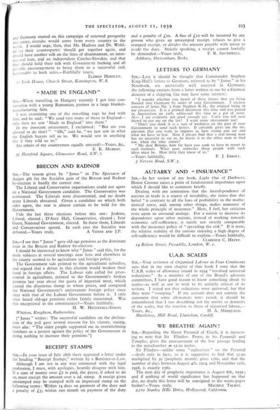REAL DISARMAMENT Snt,—As one of the millions to whom the
daily ebb and flow of war is a nightmare, as a non-pacifist pleading for peace, as an opponent of the Government most anxious to appeal for support of one of the Government's members, may I be allowed a few words on Mr. Hudson's interview with Dr. Wohltat?
And first I want to thank you for saying that if what hap- pened was what was reported, there was no occasion for censure, it was all common sense and natural, and "that if real disarmament were in question and an international loan were the means to bring it about, it need not be ruled out." But I should like to go a good deal further and say that in such a case there is no way in which money could be spent or lent that would be so wise, so economic, or of such infinite advan- tage to the whole world. Compared with a war (and unless the armaments race is put a stop to that is the alternative), what sized loan would not be an economy? The preparatory bombardment for the carnage of Messines, Passchendaele and Arras cost this country fifty millions. . . . By 1917 (and the war went on for eighteen months after) it was costing us in money L7,000,000 a clay; it left us with a debt of L7,000,000,000, and what it cost in men's lives, m broken health, broken fortunes, and broken hearts, is known only to the Devil—it can never be means! ed and never be told.
A real measure of disarmament would mean: houses instead of arsenals, playgrounds instead of drill-grounds, well-fed children of well-paid fathers, and the movement would spread through all the industries, trades, sciences and arts. We all know it. But do we all realise it? Or if we did would not Mr. Hudson's talk have met with a different reception? It is true the crucial question arises, would the disarmament be real? I am convinced that, with the experience and machinery set up in these later years, international powers and inter- national supervision could ensure its reality—that it could be effectively carried through—and that if once Great Britain
and Germany started on this campaign of renewed prosperity and sanity, recruits would come from every country in the world. I would urge, then, that Mr. Hudson and Dr. Wohl- tat (or their counterparts) should get together again, and should have another talk on the lines of disarmament, an inter- national loan, and an independent Czecho-Slovakia, and that they should hold their talk with Government backing and all possible encouragement to bring them to a successful end, honourable to both sides.—Faithfully yours,
ELDRED HORSLEY.
lc York House, Church Street, Kensington, W.8.









































 Previous page
Previous page